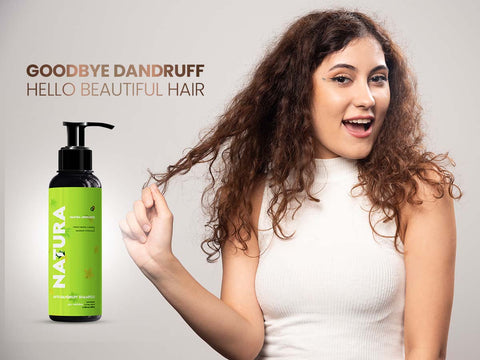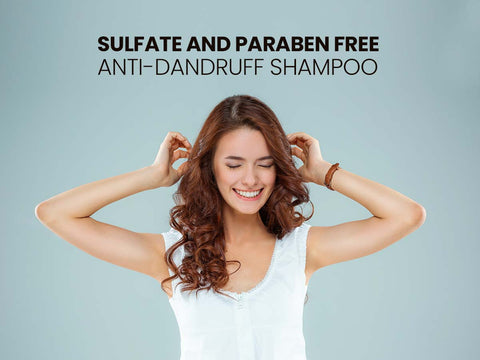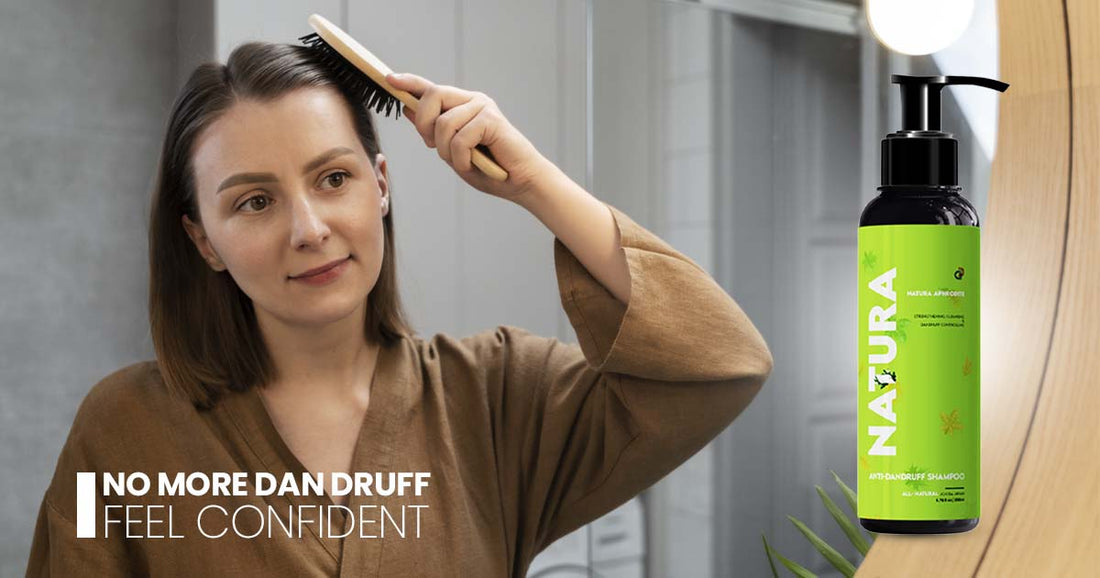Dandruff is a common scalp condition that affects millions worldwide, leading to flakiness, itchiness, and often, self-consciousness. While many see it as a mere nuisance, the science behind dandruff and its treatment is complex. Anti-dandruff shampoos are pivotal in managing this condition, offering relief and improved scalp health to those affected.
Science Behind Anti-Dandruff Shampoo
Anti-dandruff shampoos are a cornerstone in the battle against dandruff, formulated to address the root causes of flaking and itching. The science behind these shampoos lies in their active ingredients, each targeting specific aspects of dandruff's etiology to relieve and manage symptoms.
Mechanism of Action
Anti-dandruff shampoos work by:
Regulating Scalp Fungus:
Ingredients like ketoconazole and zinc pyrithione target the Malassezia fungus, reducing its population to alleviate dandruff.
Slowing Skin Cell Turnover:
Ingredients such as coal tar and selenium sulfide slow down the rate at which skin cells on the scalp die and shed, reducing the appearance of flakes.
Removing Excess Skin Cells:
Salicylic acid helps break down the outer layer of skin cells, making it easier to wash away the flakes during shampooing.
Soothing Inflammation:
Natural ingredients like tea tree oil can help soothe the scalp, reducing itchiness and irritation associated with dandruff.

Medicated anti-dandruff shampoos
Medicated anti-dandruff shampoos are specifically formulated to treat more severe dandruff and related scalp conditions, such as seborrheic dermatitis and psoriasis. Unlike regular anti-dandruff shampoos, which might primarily focus on cleansing the scalp and providing symptomatic relief, medicated options contain more potent active ingredients to treat dandruff's underlying causes.
When to Use
Persistent Dandruff:
If you've tried various over-the-counter anti-dandruff shampoos and haven't seen an improvement in your symptoms, consider a medicated shampoo.
Severe Flaking and Itching:
When dandruff is accompanied by intense itching, redness, and significant flaking, a medicated shampoo can provide the necessary relief and treatment.
Signs of Seborrheic Dermatitis:
This condition, characterized by oily, red, and scaly skin, often requires medicated shampoos to control the symptoms effectively.
Advice from a Healthcare Professional:
Dermatologists or healthcare providers may recommend medicated shampoos after assessing your scalp condition, especially if they suspect a fungal infection or other underlying problems.
Selecting Domeli’C Natura Anti-Dandruff Shampoo
When selecting a specific product like Domeli'C Natura Anti-Dandruff Shampoo, it's essential to consider various factors to ensure it meets your needs and is suitable for your scalp condition. Say goodbye to dandruff worries with Domeli’C Natura Anti-Dandruff Shampoo. Our powerful formula, designed for both men and women, fights dandruff effectively, leaving your hair fresh, flake-free, and full of confidence.
Understand Your Scalp Type
Identify Your Scalp Type:
Is your scalp oily, dry, or balanced? Different formulations are tailored to different scalp types, and using the right one can enhance the shampoo's effectiveness.
Determine the Severity of Dandruff:
If your dandruff is mild, a gentle anti-dandruff shampoo may suffice. You might need a medicated or more robust formulation for more severe cases.
Sulfate-free anti-dandruff shampoos
Sulfate-free anti-dandruff shampoos have gained popularity for their gentle cleansing properties, minimizing the risk of irritation while effectively addressing dandruff concerns. Sulfates, particularly sodium lauryl sulfate (SLS) and sodium laureth sulfate (SLES), are detergents found in many traditional shampoos that create a rich lather but can strip the scalp and hair of natural oils, leading to dryness and irritation.

Benefits of Sulfate-Free Anti-Dandruff Shampoos
Gentler on the Scalp:
Sulfate-free shampoos are less harsh, reducing the risk of irritating the scalp. This is particularly beneficial after hair removal treatments when the skin is more sensitive.
Retains Natural Oils:
By not stripping away natural oils, sulfate-free shampoos help keep the scalp and hair hydrated. This is crucial for dandruff-prone scalps, as maintaining adequate moisture can prevent flakiness and itching associated with dryness.
Suitable for Curly and Textured Hair:
Individuals with curly, coyly, or textured hair types often benefit from sulfate-free shampoos, as these hair types are naturally drier. Sulfate-free options help maintain moisture levels, define curls, and reduce frizz.
Environmentally Friendly:
Many sulfate-free shampoos contain biodegradable ingredients that are gentler on the environment. Their formulations often include natural surfactants that provide cleansing without the ecological impact of sulfates.
Combating Hair Fall Along with Dandruff
Dandruff and hair fall can sometimes co-occur as separate issues or with one exacerbating the other. Addressing both concerns requires a balanced approach:
Choose a Dual-Purpose Shampoo:
Look for anti-dandruff shampoos containing ingredients known to strengthen hair and reduce hair fall, such as biotin, niacinamide, or natural extracts like ginseng and aloe vera.
Gentle Hair Care:
Avoid aggressive brushing or styling practices that stress the scalp and hair follicles. Opt for a wide-tooth comb and minimize the use of heat styling tools.
Balanced Diet:
Ensure your diet is rich in vitamins, minerals, and proteins that support hair health. Nutrients like iron, zinc, omega-3 fatty acids, and vitamins A, C, and E are essential for maintaining strong, healthy hair.
Consult a Professional:
If you're experiencing significant hair fall or dandruff persists despite over-the-counter treatments, consult a dermatologist. They can provide targeted treatments and identify if an underlying condition contributes to your symptoms.
Use of Anti Dandruff Shampoo
Using anti-dandruff shampoo effectively is critical to managing and reducing dandruff symptoms. Here's a step-by-step guide to ensure you get the most out of your anti-dandruff shampoo:
Step 1: Choose the Right Shampoo
Select an anti-dandruff shampoo that suits your hair type and addresses your specific dandruff concerns, such as itchiness, dry scalp, or oily scalp. Look for active ingredients like zinc pyrithione, selenium sulfide, ketoconazole, or salicylic acid, known for their anti-dandruff properties.
Step 2: Wet Your Hair
Begin by thoroughly wetting your hair with lukewarm water. Hot water can strip the scalp of its natural oils, exacerbating dandruff, so it's best to use water that's warm but not hot.
Step 3: Apply Shampoo
Apply a sufficient amount of anti-dandruff shampoo to your scalp. The exact amount will depend on the length and thickness of your hair, but generally, a coin-sized amount is a good starting point. You can adjust based on your needs.
Step 4: Massage Gently
Gently massage the shampoo into your scalp using your fingertips. Avoid using your nails, as this can irritate the scalp. Spend a couple of minutes massaging to ensure the shampoo covers your entire scalp and to help loosen flakes and scales.
Step 5: Let It Sit
Allow the shampoo to sit on your scalp for the time recommended on the product label, usually around 3-5 minutes. This gives the active ingredients enough time to reduce the fungus or inflammation causing dandruff.
Step 6: Rinse Thoroughly
Rinse your hair thoroughly with lukewarm water until all the shampoo is washed out. Residue from the shampoo can irritate the scalp, so make sure no traces are left behind.
Conclusion
Dandruff can be a persistent and often frustrating condition, but with the right approach, it's manageable. By staying informed about the active ingredients and their functions, adhering to proper shampooing techniques, and maintaining a healthy scalp care routine, you can achieve lasting relief from dandruff and enjoy the confidence of having a flake-free, healthy scalp.



